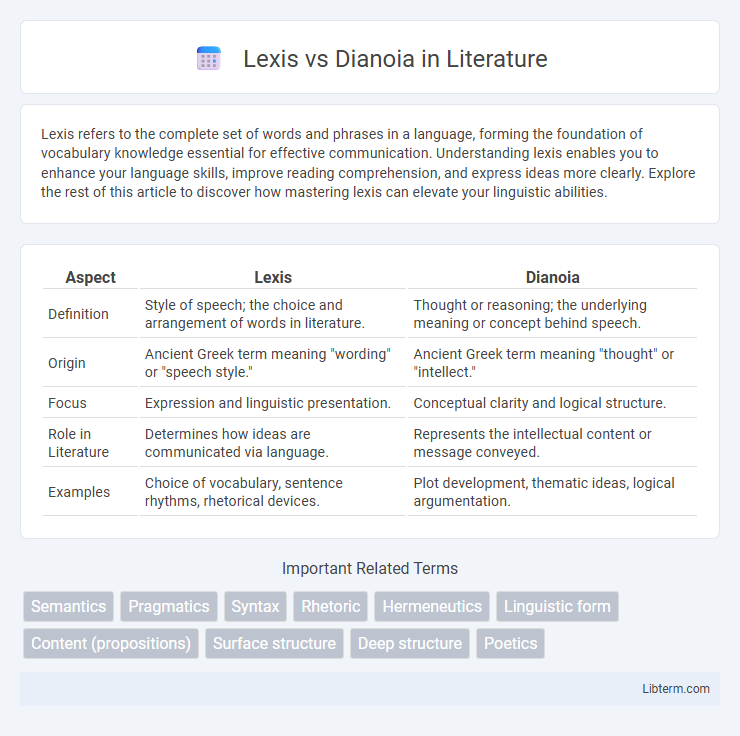Lexis refers to the complete set of words and phrases in a language, forming the foundation of vocabulary knowledge essential for effective communication. Understanding lexis enables you to enhance your language skills, improve reading comprehension, and express ideas more clearly. Explore the rest of this article to discover how mastering lexis can elevate your linguistic abilities.
Table of Comparison
| Aspect | Lexis | Dianoia |
|---|---|---|
| Definition | Style of speech; the choice and arrangement of words in literature. | Thought or reasoning; the underlying meaning or concept behind speech. |
| Origin | Ancient Greek term meaning "wording" or "speech style." | Ancient Greek term meaning "thought" or "intellect." |
| Focus | Expression and linguistic presentation. | Conceptual clarity and logical structure. |
| Role in Literature | Determines how ideas are communicated via language. | Represents the intellectual content or message conveyed. |
| Examples | Choice of vocabulary, sentence rhythms, rhetorical devices. | Plot development, thematic ideas, logical argumentation. |
Introduction to Lexis and Dianoia
Lexis refers to the choice and arrangement of words or vocabulary within a language, shaping how meaning is conveyed through specific linguistic expressions. Dianoia, in contrast, involves the intellectual process of thought, reasoning, and conceptual understanding that underpins the creation and interpretation of those lexical items. In studying language and philosophy, Lexis emphasizes the outward linguistic form, while Dianoia highlights the inner cognitive content and logical structure behind language use.
Defining Lexis: Language and Expression
Lexis refers to the vocabulary or word choice in a language, encompassing the selection and arrangement of words to convey precise meaning. It functions as the foundational element of language and expression, enabling clear communication and nuanced understanding. In contrast, dianoia pertains to the underlying thought or reasoning process that informs the use of lexis, linking language to cognition.
Understanding Dianoia: Thought and Meaning
Dianoia in philosophy refers to the process of discursive thinking that involves reasoning and intellectual analysis to grasp meanings beyond mere lexical definitions or lexis. It emphasizes the structured mental activity that interprets concepts, formulates judgments, and constructs coherent arguments. Understanding dianoia reveals how thought transcends word choice, engaging deeper cognitive functions to derive meaning and insight.
Historical Origins of Lexis and Dianoia
Lexis and Dianoia trace their origins to ancient Greek philosophy, with lexis referring to language or speech as defined by Aristotle in his Poetics, where it embodies the artistic expression through word choice and style. Dianoia, rooted in Platonic philosophy, signifies the intellectual process of thinking, encompassing rational cognition and understanding beyond mere sensory perception. The historical exploration of these concepts reveals their foundational roles in rhetoric and epistemology, influencing centuries of linguistic and philosophical thought.
Lexis vs Dianoia in Classical Rhetoric
Lexis in Classical Rhetoric refers to the style and diction used by a speaker or writer, emphasizing word choice, sentence structure, and delivery to persuade an audience effectively. Dianoia represents the underlying thought or reasoning behind the speech, focusing on the logical content and arguments presented. The distinction between Lexis and Dianoia is crucial as Lexis shapes how the message is conveyed, while Dianoia shapes the foundational ideas that drive persuasion in rhetoric.
The Role of Lexis in Effective Communication
Lexis plays a crucial role in effective communication by providing the precise vocabulary needed to convey specific meanings and intentions clearly. The choice of appropriate lexis enhances clarity, reduces ambiguity, and allows speakers or writers to connect with their audience more effectively. In contrast, dianoia relates to the underlying thought process or reasoning, but successful communication ultimately depends on lexis to manifest those ideas comprehensibly.
Dianoia’s Impact on Argumentation and Logic
Dianoia plays a crucial role in argumentation and logic by representing the process of thinking and understanding underlying concepts rather than merely the words (lexis) used to express them. It involves analytical reasoning and the internal cognitive mechanisms that lead to the construction of coherent and valid arguments. Emphasizing dianoia enhances the clarity, structure, and persuasive power of logical discourse through deeper comprehension of the subject matter.
Interplay Between Lexis and Dianoia
The interplay between lexis and dianoia lies in their combined influence on effective communication, where lexis refers to the choice of words and vocabulary, while dianoia encompasses the underlying thought and reasoning that shapes the message. Lexis provides the fundamental linguistic tools that express the concepts formulated through dianoia, ensuring clarity and precision in conveying ideas. This dynamic interaction enables speakers and writers to articulate complex thoughts coherently, enhancing overall understanding and rhetorical impact.
Lexis and Dianoia in Modern Discourse
Lexis in modern discourse emphasizes the impact of word choice, vocabulary, and stylistic expression to shape meaning and influence audience perception. Dianoia, relating to thought or intellectual content, focuses on the logical structure and clarity of arguments presented in communication. Understanding the interplay between Lexis and Dianoia enhances effective rhetoric by balancing expressive language with coherent reasoning.
Conclusion: Balancing Lexis and Dianoia in Writing
Balancing lexis and dianoia in writing enhances clarity and depth, as lexis provides precise vocabulary while dianoia shapes coherent thought and logical structure. Effective communication requires integrating rich lexical choices with critical reasoning to engage readers and convey complex ideas. Writers who harmonize these elements create impactful texts that resonate intellectually and stylistically.
Lexis Infographic

 libterm.com
libterm.com